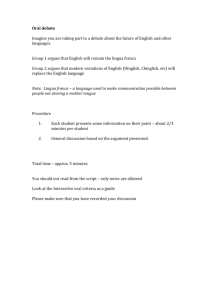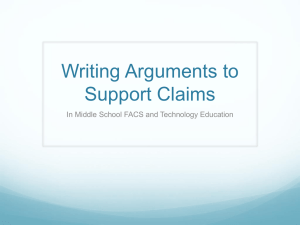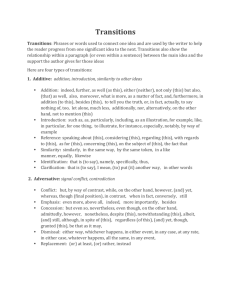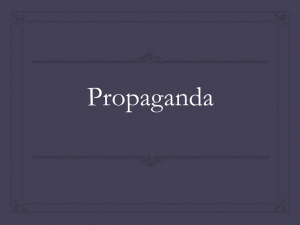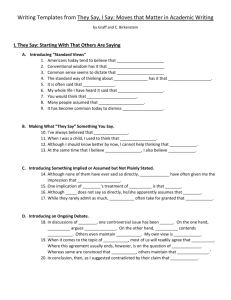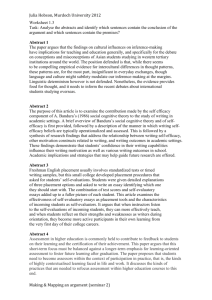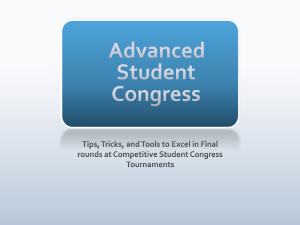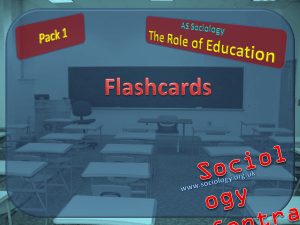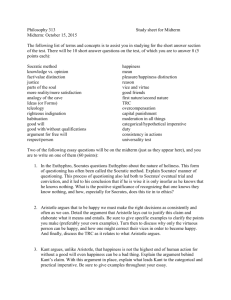Hicks_0566_Philosophy6
advertisement
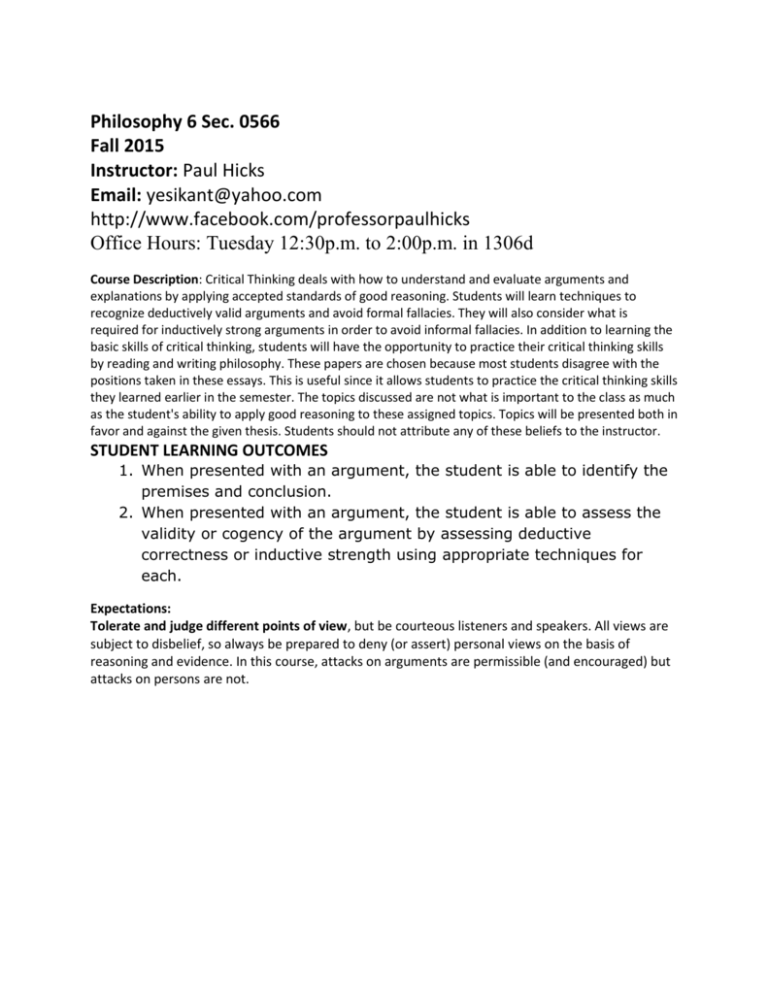
Philosophy 6 Sec. 0566 Fall 2015 Instructor: Paul Hicks Email: yesikant@yahoo.com http://www.facebook.com/professorpaulhicks Office Hours: Tuesday 12:30p.m. to 2:00p.m. in 1306d Course Description: Critical Thinking deals with how to understand and evaluate arguments and explanations by applying accepted standards of good reasoning. Students will learn techniques to recognize deductively valid arguments and avoid formal fallacies. They will also consider what is required for inductively strong arguments in order to avoid informal fallacies. In addition to learning the basic skills of critical thinking, students will have the opportunity to practice their critical thinking skills by reading and writing philosophy. These papers are chosen because most students disagree with the positions taken in these essays. This is useful since it allows students to practice the critical thinking skills they learned earlier in the semester. The topics discussed are not what is important to the class as much as the student's ability to apply good reasoning to these assigned topics. Topics will be presented both in favor and against the given thesis. Students should not attribute any of these beliefs to the instructor. STUDENT LEARNING OUTCOMES 1. When presented with an argument, the student is able to identify the premises and conclusion. 2. When presented with an argument, the student is able to assess the validity or cogency of the argument by assessing deductive correctness or inductive strength using appropriate techniques for each. Expectations: Tolerate and judge different points of view, but be courteous listeners and speakers. All views are subject to disbelief, so always be prepared to deny (or assert) personal views on the basis of reasoning and evidence. In this course, attacks on arguments are permissible (and encouraged) but attacks on persons are not. Ask questions whenever any term or concept is unclear or if you are confused or unconvinced by any claim said or read during the course of this class. I don't read minds, so please stop me and ask for (or volunteer) clarification at any time; it is very likely others share the same concerns. I will not preach. I teach people how to think critically and I introduce them to what others have thought about significant issues. I will not tell you what to think or how you should act. This course is an occasion for people to exercise careful thought, and to realize the practical value of rational deliberation. Serious disagreements will arise in class and this is good because they compel us to clarify and support our own beliefs, which is useful whenever we want to resolve conflicting points-of-view or influence the thoughts and actions of others. In this course, you should expect me to provoke people to discuss their own thoughts about issues raised in the readings and in current events. Sometimes I will be deliberately controversial and disputatious, so never assume that what I say is what I believe. Consider all issues raised in this course in a thoughtful and sincere manner, taking care to avoid poorly supported arguments and unsubstantiated opinion. Sincere statements of personal belief or disagreement are not sufficient reason for us to believe, or doubt, anything. The selected readings are chosen purposefully as to challenge mainstream attitudes. This will force students to use the skills they have learned in this class to understand and to challenge the arguments presented. Course Policies: 1. Students are graded on the finished product NOT on their effort. 2. Students are expected to arrive to class on time and prepared having read the day’s material prior to class. Students are expected to stay in their seat until class has finished. No going in and out of the classroom once class has started. This is disruptive to the class and rude to your classmates as well as your instructor. 3. All take-home assignments must be typed, 12 point font, one-sided, 1-inch margins, and double spaced. Failure on any of these points will result in an automatic 10% reduction in your assignment grade. Also, your font should be decipherable, such as Times New Roman, Arial, or Calibri. No “funky” font types like Algerian, Blackladder ITC, or Mistral. If I find difficulty in deciphering your font, whether typed or hand-written, I will consider that word, sentence, paragraph, and/or assignment missing. 4. LATE POLICY: All work must be turned in on the due date at the beginning of class. Failure to do this will result in a 50% reduction in your grade per class day late. After an assignment is one week late, it will be considered missing. All missing assignments are graded as a 0. This is substantial, even an F of 50% has a less damaging effect on your grade. a. EXTENSION POLICY: All students are allowed one paper extension. This is the only extension you will have, so use it wisely. You do not need to tell me when you use your extension or what paper the extension should be awarded to. The first paper you turn in late will automatically be your extension. The extension is good until the next class period. b. There are no extensions on exams. Students are required to take the exam on the exam date. If you are unable to take the exam with the rest of the class, you are responsible to tell me at least 1 week ahead of time. I will try and offer you an opportunity to take the exam prior to the rest of the class, if and when I can. No excuses!! 5. A hard-copy of all assignments must be submitted in person. No Assignments are graded by email. If for any reason you think I gave you a special exception to this rule, let me repeat “NO ASSIGNMENTS ARE GRADED BY EMAIL”. NO EXCEPTIONS!!! 6. ATTENDANCE: All students should be familiar with the Attendance Regulations printed in both the College Catalog and the Schedule of Classes. Students are expected to be in class on time and to remain for the entire class period. Medical appointments, work, job interviews, childcare responsibilities, etc. should be arranged so as not to occur during class time. Please do not make requests for exceptions. Any student who has unexcused absences equaling one week’s worth of class time (3 hours) prior to census date may be excluded. Students may drop the class in the Admissions and Records Office, on-line, or by phone. Students should never rely on the instructor to exclude them. Students are responsible to inform the instructor of any anticipated absences due to observance of major religious holidays so that alternative arrangements may be made. Failure to do so may result in an inability to make other arrangements or a lower grade. 7. ACADEMIC DISHONESTY WILL NOT BE TOLERATED! I WILL REPORT ANY STUDENT WHO IS IN VIOLATION OF THE POLICY. STUDENTS ARE RESPONSIBLE FOR UNDERSTANDING THE COLLEGE’S POLICY ON ACADEMIC DISHONESTY. 8. Electronic Devices: All electronic devices, such as cell phones or pagers, are to be placed on silent mode or turned off during class times. THERE ARE TO BE NO CELL PHONES OR ANY OTHER ELECTRONIC DEVICES OUT OF BACKPACKS DURING EXAMS AND QUIZZES. YOU WILL RECEIVE A FAILING GRADE FOR VIOLATING THIS RULE. CONSIDER YOURSELF WARNED, NO EXCEPTIONS!!! 9. Once you are seated for an exam, you may NOT leave the room. 10. Disruptive behavior will not be tolerated! Disruptive behavior includes, but not limited to, talking during class, leaving the classroom during class, talking and/or texting on your cell phone or other electronic device, and playing games on your laptop. Grading: Based on a 300 point scale Students will need an 882e Scantron for all quizzes and exams. Exam 1 30% Exam 2 30% Final Exam 40% Textbook: Critical Thinking: An Introduction to Basic Skills, 6th edition. Written by William Hughes, Jonathan Lavery, and Katheryn Doran. Broadview Press 2010 In addition, students are required to read supplementary journal articles which will be made available online. Reading Schedule (I reserve the right to modify the reading schedule and exam schedule as I see fit for this particular class. Although not likely, I may change the date of an exam or change any of the readings for the semester. Any modifications will be announced in class. Please make sure you are in class for all announcements) Week 1--Introduction to Reasoning and Critical Thinking Read: Chapter 1: The Value of Critical Reasoning ngth and Soundness Supplementary Papers: Ayn Rand--Philosophy Who Needs It? Mark I. Vuletic--The Nature of Philosophy Week 2: Reconstructing Arguments Read: Chapter 4 Supplementary Papers: Jeff Jordan--Is it Wrong to Discriminate on the Basis of Homosexuality? (In this selection, Jordan argues that the mere fact that there is a public disagreement about same-sex marriage should support a compromise between both sides. Jordan will lay out his argument in standard form) Pro David Boonin--Same-Sex Marriage and the Argument from Public Disagreement (Boonin argues against Jordan by suggesting the compromise is, in fact, not a compromise, and hence the argument fails based upon Jordan's own premises.) Con Week 3: Does Language Make Me Think the Way I Do? Read: Chapter 2 Meaning and Definition Supplementary Papers: Ludwig Wittgenstein--Meaning as Use (In this paper, Wittgenstein argues for Meaning as Use) Benjamin Whorf--Language, Thought, and Reality (Whorf argues our use of language creates our thought and reality.) Week 4: Uncovering Logical Frameworks through Meaning Read: Ch. 2.1-2.3 Supplementary Papers: Robert Baker--"Pricks" and "Chicks": A Plea for "Persons" (Baker attempts to uncover our conceptual framework when it comes to gender and concludes that our language is sexist due to a patriarchal conceptual framework minimizing the value of women. He argues our language reveals logical presuppositions held by dominant society) Joan Dunayer--Sexist Words, Speciesist Roots (Dunayer argues Baker does not take his reasoning far enough. She argues, by this logic, language reveals we are not just sexist, but speciesist too.) Luce Irigaray--Linguistic Sexes and Genders (Irigaray argues the words we use privilege men and dismiss women.) Week 5--Exam 1 Truth Theories Read: Ch. 6 eory Bertrand Russell--The Correspondence Theory of Truth William James--The Pragmatic Theory of Truth Week 6--Doxastic Practices Supplementary Reading: Alvin Plantinga--Is Belief in God Properly Basic? (Plantinga argues we can infer the existence of God because belief in God is part of our noetic structure) Pro Stewart C. Goetz--Belief in God is Not Properly Basic (Goetz argues against Plantinga by demonstrating belief in God is inferred and not part of our basic noetic structure.) Con Week 7: Fallacies Read: Chapter 3 Read Chapters 6.7, 7.3-7.4, 8.2-8.5, 14 Supplementary Readings: Paul Hicks--Fallacies Week 8: Acceptability of Statements Supplementary Reading: Monique Wittig--One is Not Born a Woman (In this paper, Wittig argues our traditional way of defining a woman analytically dismisses non-heterosexuals as not-women) Pro Jacob Hale--Are Lesbians Women? (Hale reconstructs Wittig's argument in standard form. He critiques her premises via meaning as use to show her conclusion that lesbians are not women fails. He points out numerous fallacies used traditionally in defining the term "woman." He then reconstructs the "Natural Attitude Towards Gender" and argues these characteristics are in contradiction with each other. He further creates his own definition of woman by using 13 characteristics for the concept of woman which he defines as neither necessary nor sufficient conditions for the concept woman.) Con Week 9: Inductive Reasoning Read: Chapter 10 Inductive Argumentative Forms Supplementary Reading Thomas Aquinas--Of the Reason for which Simple Fornication is a Sin by Divine Law Michael Levin--Why Homosexuality is Abnormal (Levin uses an Induction by Confirmation to argue homosexuality is abnormal, and thereby, analytically bad.) Stephen Sullivan--A Critique of the Impeded-Function Objection to Gay Sex (Sullivan argues against the position given by Levin) Marilyn Frye--Oppression (Birdcage Analogy) Week 10: Exam 2 Argument to Best Explanation. How can we choose between two competing theories? Read: Chapter 11 Supplementary Readings William Alston--Religious Experience and Religious Belief William James--Religious Experience as the Root of Religion Week 11: Argument to Best Explanation cont... Wayne Proudfoot--Religious Experiences as Interpretative Accounts Michael Martin--Critique of Religious Experience Week 12: Deductive Reasoning Read Chapter 9 -Functionally True -Functionally Equivalent -Functionally Consistent Supplementary Readings Paul Hicks--Truth Tables Edmund Gettier--Is Justified True Belief Knowledge? Week 13: Truth Tables cont... Week 14: Theoretical Models Janice Raymond--The Transsexual Empire (Raymond argues for a particular definition of gender and rape.) Pro Talia Bettcher--Evil-Deceivers and Make-Believers: On Transphobic Violence and the Politics of Illusion (Bettcher argues against Raymond by demonstrating transpersons are defined through a false dichotomy which leads to a blameshift fallacy.) Con Thomas McCaullay-Millar--Towards a Performance Model of Sex (McCaullay-Millar argues there are two conceptual models for thinking about sex, then argues in favor of the performance model.) Week 15: Theoretical Models and Practicing Philosophy Papers Natasha Vargas-Cooper--Hardcore Robert Jensen--Patriarchal Sex (Jensen argues the theoretical model for sex is, in and of itself, patriarchal.) Julia Serano--Why Nice Guys Finish Last (Serano argues our framework forces us into a dichotomy by which both men and women are forced to choose the relationship we have to other genders)
